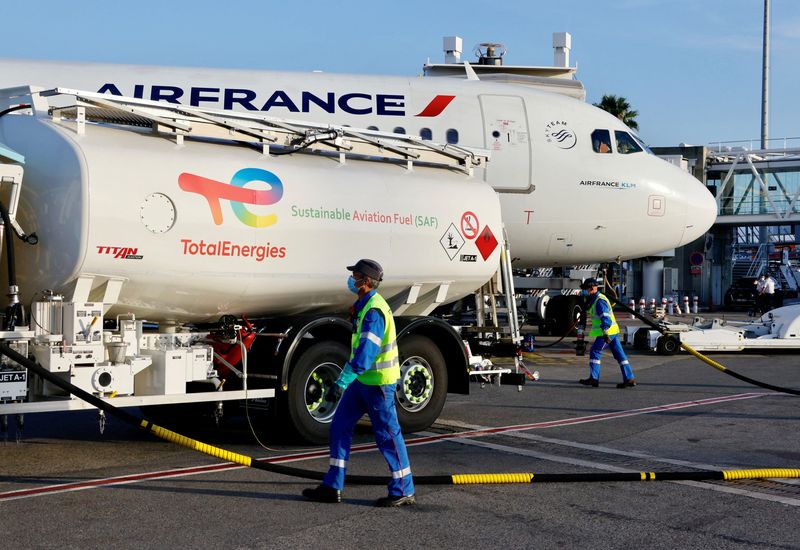By Allison Lampert and Rajesh Kumar Singh
(Reuters) -Rising airline traffic is expected to trigger global emissions-related requirements for some carriers as early as next year, according to a top airline trade group, even as debate broadens on the effectiveness of that approach.
A United Nations-led scheme seeks to cap emissions from international flights at 85% of 2019 levels under the first phase of its Carbon Offsetting and Reduction Scheme for International Aviation (CORSIA) beginning next year.
That threshold is expected to be crossed sometime in 2024 based on current traffic recovery, trade group IATA told Reuters.
Carriers in the first phase could purchase offsets as early as that year, with international travel expected to rebound to near 2019 levels.
Combating aviation pollution is key for the fight against climate change as the industry generates roughly 3% of global emissions. As traffic rebounds from a COVID-19 pandemic-induced slump, some travelers are reviving "flight shaming" pressure to seek lower carbon alternatives.
With technologies like electric and hydrogen-powered aircraft still unproven, and sustainable aviation fuel (SAF) in short supply and exorbitantly costly, airlines are buying credits in pollution-lowering projects like planting trees to offset their emissions.
However, while offsets cost less than SAF, critics say they do not lower actual airline emissions.
CARBON OFFSETS
Although CORSIA's first phase is voluntary, airlines from participating countries follow it. CORSIA becomes mandatory in 2027.
IATA's expectations had not previously been public.
Airlines currently buy carbon credits voluntarily. Under CORSIA, carriers from more than 100 participating countries would have to offset rising emissions above the baseline of 85% of 2019 levels.
Offsetting amounts, which depend on traffic, are not yet clear. The U.S. Federal Aviation Administration said requirements during CORSIA's first phase will only be calculated in 2026, though IATA said airlines can start buying credits earlier.
CORSIA was approved in 2016 by the U.N. International Civil Aviation Organization's (ICAO) assembly. ICAO cannot impose rules on governments but its 193 member countries overwhelmingly adopt its standards.
IATA and major airlines support CORSIA, which avoids a patchwork of regional emission rules that could raise costs, but some executives have criticized offsets.
United Airlines CEO Scott Kirby (NYSE:KEX) has dubbed them "greenwashing" and called for an end to them, estimating that planting trees on every acre of available land would address less than five months of emissions. Instead, he wants the industry to focus on SAF, innovations like electric aircraft and carbon sequestration.
"For an airline, it makes absolutely no sense to buy expensive SAF when it can actually buy cheap offsets instead," said Jo Dardenne, aviation director for Brussels-based Transport & Environment.
SAF is produced in tiny quantities from feedstocks such as cooking oils and animal waste and cost two to five times more than conventional jet fuels. Ramping up production and making it commercially viable would require massive investment, such as government incentives including tax credits.
Global SAF production is estimated to meet just 2% of global aviation's fuel needs by 2025, according to IATA.
"Many airlines would prefer to reduce their offsetting requirements by reporting SAF use, but governments largely haven't done their part to help make any more SAF available – even where they have imposed mandates," IATA said.
Carriers like Easy Jet have moved away from offsets and United still targets net-zero carbon emissions by 2050 without relying on traditional offsets by primarily betting on SAF. But, as of last December, the total volume of SAF used in its operations remained less than 0.1% of its total aviation fuel usage.
Carbon credits certified under the U.N. plan "will be necessary," Sara Bogdan, head of Sustainability and ESG at JetBlue Airways (NASDAQ:JBLU), told Reuters.
ICAO touted the integrity of CORSIA since governments in consultation with environmental protection groups developed its criteria for offsets.
JetBlue is relying on more SAF and fuel efficient aircraft to reduce emissions. It has offset more than 11 million metric tons of emissions through 2022.
A metric ton of carbon reduction through offsets costs about $10 to $15 versus about $200 through SAF, United chief sustainability officer Lauren Riley said.
"The economics are tough," she told Reuters.
